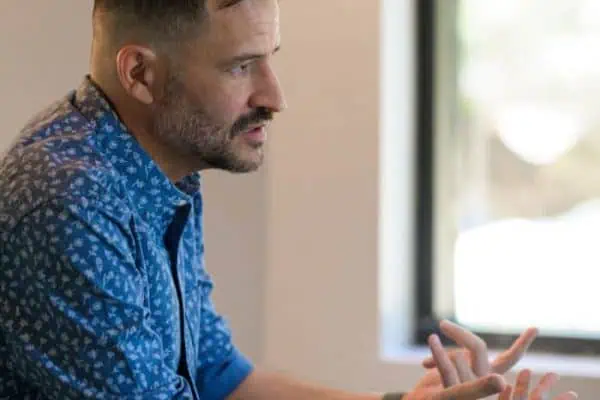When I talk to clients about anxiety and why do people get nervous, I often hear stories of people feeling like they are drowning in anxiety. When you feel this way, it’s hard not to want to never feel this way again but anxiety is actually a healthy thing.
Kevin Fall, PhD, a professor of counseling at Texas State, once described anxiety being like fire for when you are cooking. A little is good but too much and it burns things quickly. Anxiety can also be a good thing as it gives us data about things. Maybe that’s a relationship where something is happening and making us apprehensive about it. It could be a job that’s stressing us out and there is something we need to change. Below is an interesting short video on the science behind what happens in our body when people get nervous.
Why Do People Get Nervous
What’s the difference between being nervous and having anxiety?
When reflecting on anxiety and nervousness, it’s important state that nervousness is a normal state that affects all of us when something threatens our system. This could be a job interview, performing on stage, or giving a speech. When your nervousness becomes irrational, feels overpowering, and possibly even prevents you from participating in everyday life situations, then you may be experiencing anxiety. Nervousness and anxiety lie on a spectrum; while nervousness is a temporary reaction to a specific event, anxiety can persist and create a more enduring sense of worry, even without a clear cause.
What to do when you feel anxious?
One of the most important parts of nervous anxiety is to try and understand the sources. The analogy I will use about why do people get nervous is one of a two liter Coke on a car ride home. If you open up your Coke when you get home and it spews over, you would likely think about the pothole you hit on the way home, the sudden stops, etc.
Our body can be very similar to this as we pressurize too from different events that jolt us over the day. In the moment, they may not seem like much, but that pressure can build. This varies a lot from person to person but there tend to be micro and macro triggers behind our stressors and the first step tends to be identifying them if we haven’t already.
Just like pressure builds up in a shaken Coke bottle, our bodies accumulate tension from daily stresses, which can eventually erupt as anxiety or even physical symptoms like tension headaches, rapid heartbeats, or stomach discomfort. Journaling (iOS also includes a journaling app in iOS 18) and even an Apple Watch (keeping track of your pulse) can help you with this process. Journaling can help uncover patterns; writing down when and where anxiety hits can clarify specific triggers or patterns that might otherwise go unnoticed.
When anxiety arises, practicing self-compassion can prevent harsh self-criticism, which often amplifies anxious feelings. It helps to acknowledge that your feelings might be overwhelming at the moment but they are true in this moment. Don’t be critical of yourself for feeling that way!
The second step involves a process of grounding yourself as anxiety comes up. Breathing exercises can be very helpful and so can exercise. Below are a few that might be helpful to you:
- 5-2-5 Count: Using your stomach, inhale for a count of 5 seconds. Then, at your maximal point of inhalation (the point where you feel you can’t breathe in any more) hold your breath for a count of 2 seconds. Then, exhale all the built up air over another count of 5 seconds. This cycle should be repeated twice, followed by 5 cycles of breathing normally. The overall point of this exercise, and why it’s proven to be effective as panic attack treatment, is because it focuses the person on breathing – and the process that pertains to it –instead of focusing on the intense fear and anxiety caused by the panic attack.
- Progressive Muscle Relaxation: Slowly tense and release different muscle groups, moving from your toes to your head, to release stored tension.
- Physical Exercise: Although this isn’t directly a breathing exercise, it is one of the best methods of panic attack treatment. Doctors suggest working out 30 minutes a day will reduce the onset of panic attacks. It’s more of a natural habit (like sleeping and eating healthy) that tends to lead to a healthier and more ordered mind. Incorporating mind-body activities like yoga or tai chi can blend physical exercise with relaxation, helping both the body and mind reset.
Counseling:
Counseling can get into the deeper underlying issues. Therapeutic approaches like Cognitive Behavioral Therapy (CBT) are especially effective for reframing anxious thoughts, while EMDR (Eye Movement Desensitization and Reprocessing) can be powerful for anxiety rooted in trauma. I see this a lot with people going through stress, PTSD, and transition in their lives. This could be do to a divorce or things that they aren’t even aware of on a conscious level like being unhappy with a job not realizing it till they have symptoms of the stress manifesting through things like panic attacks.
Counseling can dig deeper down into these issues and help lead to insights which will reduce stain and implement improved coping mechanisms. If you choose to try counseling, I suggest you sample several counselors and see who feels like the right fit for you. If you don’t feel like it is the right fit, you aren’t going to do good work.
Medication:
Medication can be a piece of the puzzle for successful treatment but many times it will only treat the symptom and not the problem. Many doctors will prescribe things like Xanax for panic attacks but people can become addicted to drugs in the class very easily and it is very short acting. In addition to medications like Xanax, which are quick-acting but short-lived, other options like SSRIs (Selective Serotonin Reuptake Inhibitors) or SNRIs (Serotonin-Norepinephrine Reuptake Inhibitors) can provide longer-term management without the risk of dependency.
For anyone struggling with panic attacks I would suggest they consult with a well reviewed psychiatrist for a medical evaluation. General practitioners like your family doctor are not as experienced in issues like this and may miss things or misdiagnose what may be obvious to a psychiatrist.
If you have any specific questions that we may be able to help with, don’t hesitate to let us know! You can contact us to make a counseling appointment and check out anxiety counseling for more information. Want to read more about anxiety? Read some of our articles on how to manage anxiety and stress:
- Stewart Smalley Had it Right All Along. Positive Thinking is Power
- Don’t Let the Future Hold You Back From The Your Moment
- Back to School Blues and Stress Relief for Adults
- The Beauty of Self Acceptance
- Quit Camping in Your Comfort Zone: 30 Days to Shake Things Up
- The Courage to Be Imperfect-Part I: The Relationship Between Fear and Perfectionism
Author: William Schroeder, LPC




